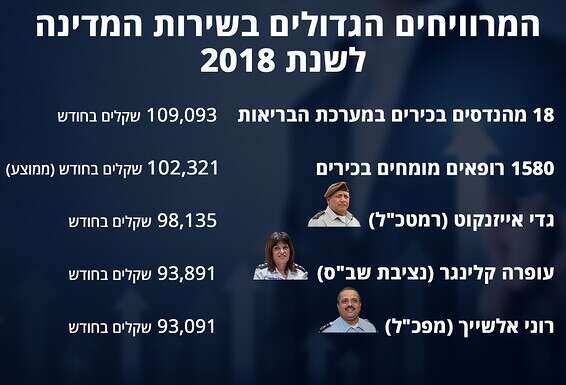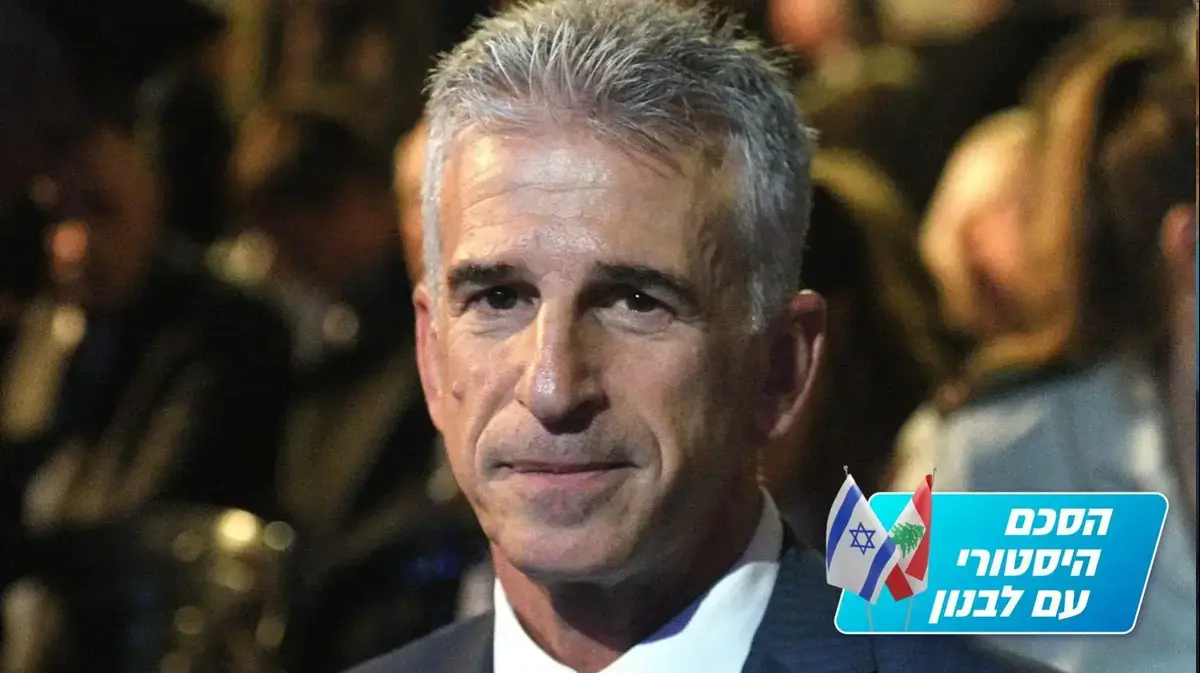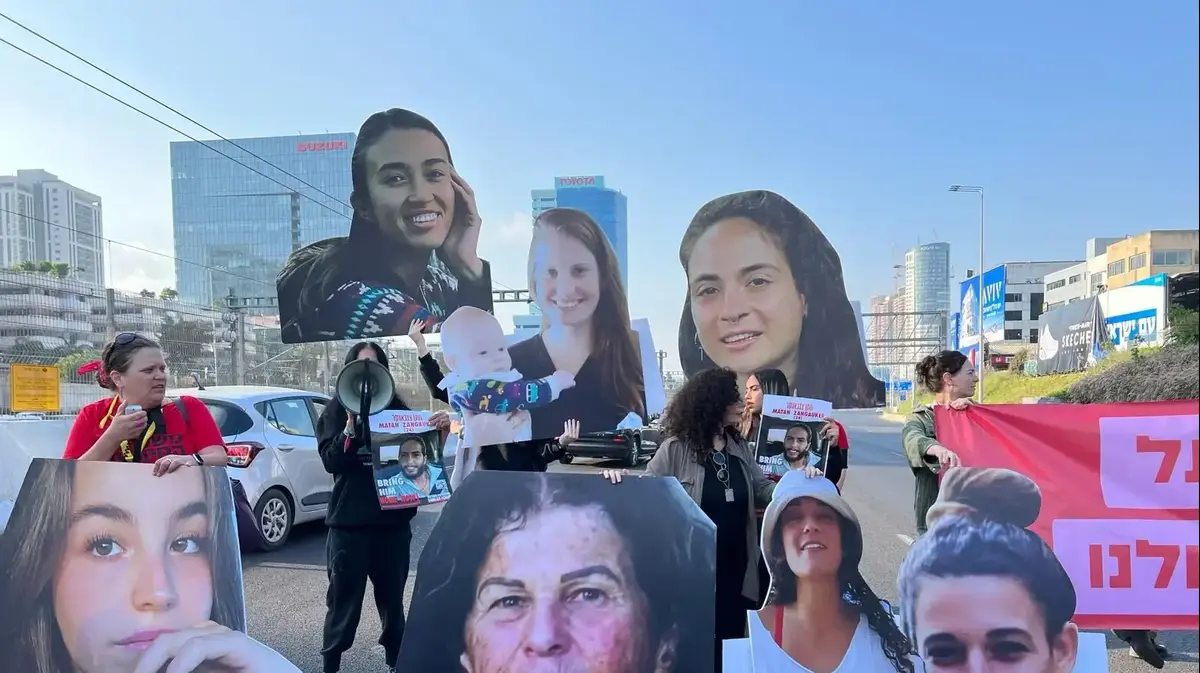Published by the Wage Commissioner for 2018: Less than 200,000 workers cost us more than NIS 184 billion in payroll expenses • Average civil service wages - NIS 16,623, in the economy as a whole - only NIS 10,000 • Full data
Alshich (right), Nitzan and Mandelblit // Photos: Coco, Gideon Markovich, Oren Ben Hakun
Kobi Bar Nathan's report on wages for civil service and defense agencies for 2018 reveals quite a few interesting data: At that time, Chief of Staff Gadi Eisenkott's salary reached NIS 98,135 a month, the IPS payroll, Ofra Klinger, was NIS 93,891 a month, and the salary of the police commissioner, Rahamim Elshich, was NIS 93,091 a month.
Israel Treasury has learned from a treasury official that Attorney General Avihai Mandelblit's salary is about NIS 75,000 and former state attorney Shai Nitzan is about NIS 70,000 a month. The top decile in the Ministry of Justice and the Attorney General earns about NIS 76,000 a month.
In the health system, government hospitals and health corporations, 18 senior engineers 'celebrated' with a particularly high average salary of NIS 109,093 per month. Additional satisfied earners are more than 1,580 senior specialist doctors, with an average salary of NIS 102,321 per month.
Photo: Benny Pleven, Zohar Glickman, Moshe Ben Simhon
Overall, the average salary in the top decile in the health system reached NIS 77,591 a month. In the IDF, the champion earned NIS 67,135 a month in 2018, with Brigadier earning NIS 55,996. Police earned an officer in the rank of NIS 55,669 a month, and a subordinate earned a handsome salary of NIS 50,263.
Impresses that the real 'salary celebration' in 2018 has been in the healthcare system on all levels. Apart from the 18 senior engineers who enjoyed a particularly high average salary of NIS 109,093, and more than 1,580 senior specialist doctors who enjoy an average salary of NIS 102,321, 1,198 senior nurses earned an average salary of NIS 41,771. The average salary in the top decile in the health system reached NIS 77,591. Laboratory workers earned NIS 35,052. The nurses were satisfied with an average salary of NIS 29,680. Full-time interns went home at the end of the month with only NIS 11,606.
Israelis like to hit IDF officers, but compared to doctors whose salary is more than explanatory. IDF champion earned NIS 67,135, Brigadier earned NIS 55,996, Colonel earned NIS 40,525 and NIS earned NIS 32,054. Physician army officers, engineers And jurors earn higher wages.
A police officer earned NIS 55,669, a sub-earner earned NIS 50,263, a sub-earner earned NIS 40,040 and the High Commissioner earned only NIS 31,901. Police, engineers, computer personnel, doctors and lawyers also earn higher wages, of course.
In 2018, the average salary in the top decile in the security agencies was: NIS 48,657, secret bodies NIS 40,765, NIS 39,929, Israel Police NIS 31,947. The average salary of all security personnel was: NIS 20,180, permanent staff NIS 22,430, secret bodies NIS 22,303, civilians NIS 19,465, Israeli police NIS 17,312, IPS 16,478.
And what was the average salary of all and all employees in the health system? Doctors NIS 33,829, nurses NIS 18,128, laboratory workers NIS 16,263, interns NIS 10,039. The health system and government hospitals have 33,067 employees: 11,063 nurses, 4,588 doctors, 1,759 pre-medical and 10,904 administrative and economic staff.
The average wage rate in the top decile of the civil service: NIS 75,156, Judges 56,353, Legal NIS 53,021, NIS 49,225, Foreign service diplomats NIS 46,708, NIS 42,126, Public Defender NIS 40,833, Engineers NIS 27,303, economists NIS 25,466, Assistant Ministries and CEOs NIS 27,095, journalists / speakers NIS 23,901, NIS 23,008 social workers, NIS 18,715 border crossers, NIS typists NIS 13,377.
In total, less than 200,000 workers pay taxpayers more than NIS 184 billion in payroll expenses; Since 2009, the salaries of government ministry workers have risen by 37% and the health workers' salaries have risen by 44% - while inflation in those years has been meager and has risen by only 10%.
The average civil service salary in 2018 stood at NIS 16,623, which is 36% higher than the average salary of only NIS 12,214. It should be noted that the average wage in the entire economy was about NIS 10,000, with two-thirds of Israeli workers earning less than the national average wage.
The highest average salary in the health system was NIS 18,534, followed by the security system NIS 17,627, in the government offices NIS 16,623, and the lowest average wage was recorded in the education system - only NIS 12,486.
The median salary in the civil service was 14,640, twice the median salary in the entire economy, which stood at only NIS 7,300, and half of the civil service workers earned a salary higher than NIS 14,640 a month.
The payroll report covers government ministries, government hospitals, government education systems and security agencies, covers a total of about half of the general public sector employees, a total of 197,991 employees, with 178,760 jobs. These figures do not include classified security workers. Over the past five years, there has been a 15% increase in both the number of jobs in the government and the education system, compared with only a 10% increase in the population.The payroll expenses in the government education system cost taxpayers about NIS 37.5 billion, direct salaries of government ministry employees And government hospitals reach NIS 31 billion In, and another NIS 6.5 billion employer costs.
Civil service employees enjoy vacation days and sick leave times higher than what is prescribed by law, through promotion mechanisms. Additional benefits to which civil servants are entitled are reflected in working hours, automatic wages, pension contributions on most components of salaries, contributions to a training fund, and other ancillary conditions. The seniority component among civil servants, paid by collective agreements with the workers' organizations, is a significant component of wages, among the ratings of government ministries employed in collective agreements.
The wages of workers in the upper decile are 2.6 times higher than the wages of workers in the lower decile. Employees in the top decile are usually old workers, who enjoy a significant increase in seniority, while the employees in the lower decile are usually new employees with no significant seniority. The civil service has employee compensation practices by performance. Often, the Histadrut workers' committees consider these remuneration methods a reward benefit and therefore there is difficulty in updating the measurement methods. More than 50% of the civil service employees' quantitative output measurement methods are out of date and were set more than five years ago.
In 2018, there was an increase of about NIS 60 million in total premium payments in government offices and government hospitals. Failure to update remuneration measurement methods explains about one-third of the increase in payments.
Among employees employed in the same ranking from 2009, the average salary of academics employed in a collective agreement increased by 104% in the past decade, compared with only 67% among other employees in the administrative ranking. In addition, out of the population of permanent workers, the attorneys' wages and tax authority's employees increased significantly compared to the rest of the civil servants.
Physician-rated employees have the highest average income in the entire health care system, with a significant disparity from the rest of the ratings. The average salary of physicians who graduated in close proximity for 2009 and remained in the system has increased by 172% over the past nine years. The state implemented an incentive program from 2011 to 2019 with the aim of incentivizing doctors to work in peripheral hospitals and in distressed professions, so doctors' wages in peripheral hospitals are higher than thousands of shekels from their salaries in central hospitals. Between 2010-2018, doctors 'wages in the center increased by about 40%, while physicians' wages in the periphery increased by 73%. Women in the health care system have fewer managements compared to men, and this difference accounts for 23% of the average salary gap between male and female physicians.
Israel leads to wage gaps between veteran and young teachers among OECD countries. Teacher pay is not low in international comparison. In relation to the salaries of full-time high school employees, teachers' wages are higher than the OECD average. The seniority component is the most dominant in determining teachers' wages in Israel, as reflected by the salary gap between beginning teachers and senior teachers. In addition, the seniority component of teachers is an incentive not to advance to administrative positions. School administrators are appointed at a relatively young age, and an administrator's term can reach more than 20 years. In recent years, there has been a significant increase in the number of teaching instructors in academic retraining courses at teacher training colleges. There is not necessarily a connection between the college's academic degree and his / her specialization in teaching.
Retirees today from the defense establishment are entitled to a much larger budget pension benefit than the rest of the public sector. The main reason for this is the early retirement age, which puts the total pension payments that have been withdrawn from the security system expected to receive about NIS 4 million from his retirement, while health and education systems employees are expected to receive about NIS 2 million. The highest payments are expected to receive IDF retirees - about NIS 8 million.









